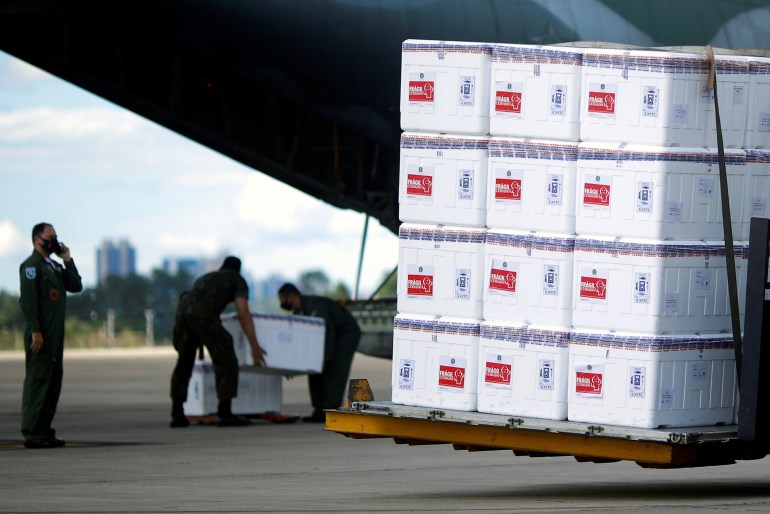Brazil begins COVID vaccinations amid delay of ingredient imports
Lagging immunisation drive further hampered by wait on active ingredients from abroad to finish doses for distribution.

Brazil has kicked off a nationwide COVID-19 immunisation programme by distributing doses of a vaccine from China’s Sinovac Biotech following an emergency-use authorisation, although the pace of vaccination will depend on delayed imports.
After weeks of setbacks, many Brazilians cheered the first wave of inoculations, from Sao Paulo to Rio de Janeiro, the hardest-hit state in the country.
Keep reading
list of 4 itemsBrazil airlifts emergency oxygen to Manaus amid COVID surge
Brazil: COVID-hit Amazonas state receives more emergency supplies
Brazil approves two COVID vaccines for emergency use
The Health Ministry gave states the green light to start immunising at 5pm (20:00 GMT) on Monday, although some officials lost no time in starting the vaccinations.
Minutes after federal health agency Anvisa approved the Sinovac vaccine on Sunday, Monica Calazans, a 54-year-old nurse in Sao Paulo, became the first person to be inoculated in the country, as Sao Paulo Governor Joao Doria looked on.
“After hearing from the governors, we came to the conclusion that today we will distribute the vaccines to the states,” and they “can begin to vaccinate” immediately, Health Minister Eduardo Pazuello said Monday.
He made the announcement after meeting state leaders at Guarulhos airport in Sao Paulo, from where 4.5 million doses of China’s CoronaVac vaccine will be sent nationwide.
Health workers, people older than 75, residents of old age homes and Indigenous populations will be the first to be vaccinated. Both the CoronaVac and the Covishield require two doses.
Northern Amazonas state, which has been battling record deaths and burials as hospitals run out of beds and life-saving oxygen, should receive its first batch of vaccines late on Monday and will start inoculating people on Tuesday morning, the government said.
Pazuello had initially said the government would start distributing vaccines to all 27 states on Monday for a national inoculation campaign to start Wednesday.
While many countries have already started vaccination drives, including some among its neighbours, Brazil, with its population of some 213 million, has lagged behind.
CoronaVac has been dragged into a political standoff between far-right President Jair Bolsonaro, who has repeatedly tried to discredit it, and Doria, a defender.
Bolsonaro, a COVID-19 sceptic who has refused to take a vaccine himself, had faced fierce criticism for the lack of immunisation in Brazil.
The country has lost nearly 210,000 lives to COVID-19 – the pandemic’s worst death toll outside the US.

Waiting on active ingredients
On Sunday, Anvisa approved emergency use of the Sinovac vaccine and one from AstraZeneca Plc, although a hurried plan to get two million doses of the AstraZeneca vaccine was hamstrung by a lack of export approval from India.
That was one of several hurdles threatening to slow Brazil’s already lagging immunisation efforts, as local manufacturing partners for both vaccine makers wait on active ingredients from abroad in order to fill and finish doses for distribution.
The Butantan Institute run by Sao Paulo state needs another shipment of Sinovac’s ingredients by the end of the month in order to hit its target of 46 million doses by April, the head of the institute told a news conference.
The federally funded Fiocruz biomedical centre in Rio de Janeiro is still awaiting its first shipment of ingredients for AstraZeneca’s vaccine, pending Chinese export approval.
Sao Paulo already has six million doses of the CoronaVac vaccine, which a Brazilian trial had found to be 50 percent effective in preventing coronavirus infection, and the health ministry announced this month it had signed a deal with the Butantan Institute to produce 100 million more.
Last week, Bolsonaro announced a commercial plane would be sent to India to collect two million doses of Covishield, produced there by the Serum Institute.